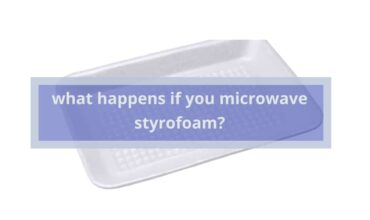Microwaves are a must-have in every kind of kitchen. You will find it in homes, dorm rooms, bachelor pads, and RVs. The reason is their versatility.
Microwave ovens are ideal for reheating, cooking, and baking, as well as speeding up cooking time, especially for those who have no time or even energy to spend a long time preparing meals.
Despite their popularity, microwave ovens are dangerous and not entirely risk-free, which means if they are misused, a lot can go wrong!
That’s why in the next few lines, you will find the answer to the frequently asked question: Can Microwaves Explode?
Before diving into the reasons that might trigger microwave ovens to explode, you need to know first how these kitchen appliances actually work.
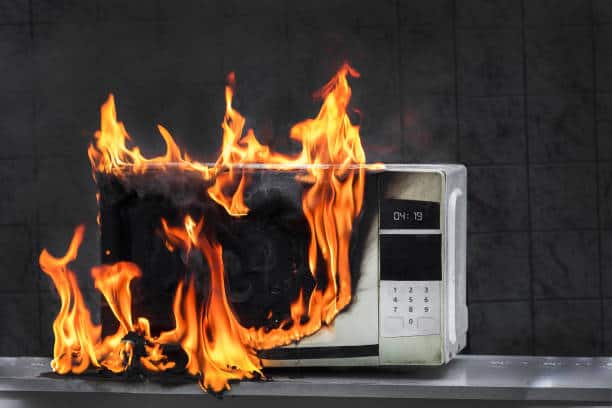
How Does a Microwave Work?
In microwave ovens, energy called microwaves are sent through uses electromagnetic radiation into food specifically into carbohydrates, water molecules, and fats, to heat and cook the food.
The household current is increased inside the oven using a device called a transformer, which is then transformed into electromagnetic waves by a magnetron.
Although they are shorter than radio waves, microwave radiation is longer than infrared waves. These microwaves are thrown around the room until they strike the meal, at which point they stick to it.
As a result, the outside part of the food usually gets cooked b first, and the interior is cooked by transferred heat, and this definitely takes considerably longer.
Microwaves also feature turntables or what is also known as rotating glass plates.
This device contributes to producing an even cook, the reason is that in the interior of the microwave oven, the microwaves create static energy columns known as standing waves.
In order for the waves to evenly reach the food, the rotation process is required. So, to achieve even cooking, it is advised to stir or move the food as it cooks, especially with older versions that do not have a revolving plate.
Read More: https://kitchenzad.com/what-is-microwave-vent-fan-for/
What Causes Microwave Ovens to Explode?
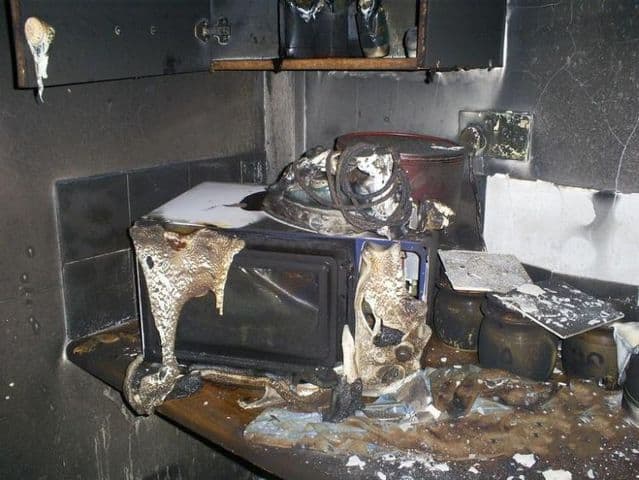
Here is a list of everything that can increase the chances of explosions:
Placing Metalic Objects in the Microwave Oven
Grab the instruction manual of your microwave oven if you still have it, and check it out, you will find a warning indicating that you should not place metallic containers in the microwave chamber.
the reason is the atoms found inside metals have free electrons, and when microwaves go through those electrons, they move extremely fast, producing heat inside the metallic object.
As the temperature gets high, the metallic object will keep on heating, till it reaches a temperature at which the object might burn the microwave.
As a matter of fact, this does not trigger a fire or explosion every time, the reason is these metals are usually thick like thick pots and pans, which will heat up quite slowly.
However, the serious threat is when the metal utensil has an uneven surface or sharp edge because the free electrons that move fast create concentrated negative charges.
When the negative charges expose to air particles, sparks are produced, which might cause an explosion if it hits a flammable object.
All in all, no one knows what the future holds, so make sure you avoid using metal utensils inside the microwave chamber.
A Faulty or Failing Microwave
one of the reasons that can cause your microwave oven to catch fire is an issue with the standard parts and manufacturing process.
Microwave brands that are not regulated may not be up to specifications, as they can be utilizing inferior capacitors and magnetrons or wire of the incorrect gauge.
These parts will end up failing quietly or with lots of smoke, a burning smell, a loud pop, and in the worst-case scenario a fire. That’s why you should buy the microwave oven from a known brand and a trusted seller and make sure that the unit has a safety certification and warranty.
Read More: https://kitchenzad.com/can-you-microwave-glass/
Faulty Wiring
Even well-built microwaves can occasionally blow up because of faulty wiring and parts. Components like capacitors and the magnetron experience increased stress as the machine matures.
Finally, an electric surge might overload the units, causing them to blow up. As an alternative, frayed wiring or flimsy connections could come undone and cause explosive short circuits or simple sparks that could ignite surrounding components.
Cooking Certain Foods
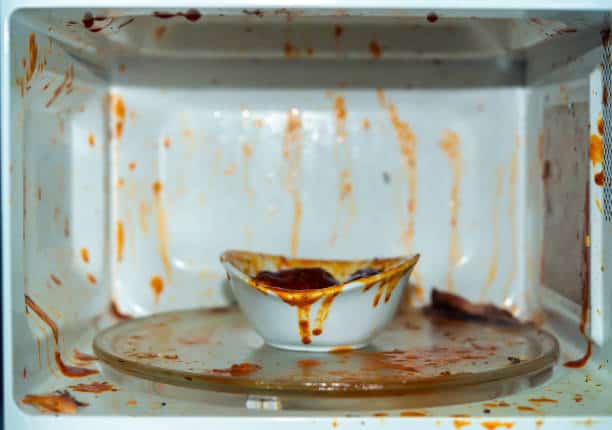
There are many types of food items that can explode in a microwave oven and many others that are prone to explode more than others.
Food items with a seal have a high chance of bursting, that’s why it’s best to puncture a few holes in the skin before cooking something like a baked potato, in order to prevent the hot water content from boiling into steam and then exploding to release that steam.
Here is a list of the food items that are dangerous to cook inside the microwave.
Hot Pepper
Capsaicin which is the active component of chili peppers is volatile. If you operate the microwave oven for long amounts of time to heat the capsaicin to combustion temperatures, the pepper in the microwave could actually result in an explosive combination.
That’s why it is always recommended to make a few holes inside the pepper using a fork to prevent the explosion of the food item.
Eggs
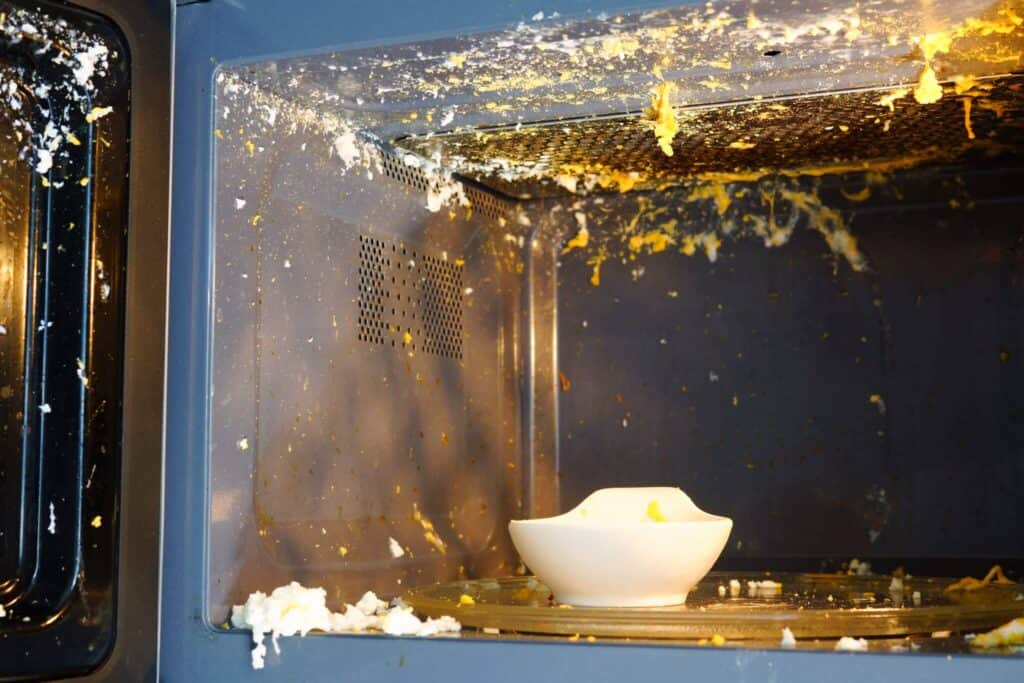
There isn’t a type of food that is more notorious than hard-boiled eggs! they have a long history with microwaves! Preparing an egg with its intact shell inside the chamber makes minimal space for the inside of the egg to heat up.
And as the egg warms up, the inside moisture transforms into steam, building pressure. The pressure will end up exceeding what the shell can handle, which causes dangerous microwave fires.
Grapes
Grapes burst because their form can concentrate microwave radiation between their parts (particularly when split in half). This might cause a plasma to form out of the air and other molecules, which could then arch, catch fire or explode.
Liquids
Since liquids such as sauces, dips, or liquids can explode, you should always cover their top with a cap or cover in order to prevent spills from entering the microwave’s chamber.
Inside a microwave, boiling water can potentially erupt, which is highly dangerous because it boils without being noticed. To prevent burning, heating water should be carefully supervised and frequently checked.
Even though the items listed above are food items that have a long history of causing explosions inside the electrical appliance, reheating other kinds of food can still cause smaller explosions.
For instance, pops might be mild or significant when preparing liver or other seared or fried meats.
This occurs because the crunchy outer layer is stiff to the expansion while the warm, juiciest interior emits steam. bubbles of water vapor will pierce this skin with soft pops and violent bangs.
In this instance, there will be reassuring sizzling sounds interspersed with them. Fortunately, they don’t begin until the meal is warm enough to eat, but still, you need to keep an eye on them and make sure you don’t overcook them.
Read Also: https://kitchenzad.com/can-you-put-parchment-paper-in-the-microwave/
Things You Should Never Do With Your Microwave
Don’t warm up breast milk in a microwave
You should never warm up the breast milk for your baby in the microwave oven for more than one reason. The first reason is this heating process can cause hot spots in the milk, which isn’t at all safe for the baby.
The second reason is Inside a microwave, boiling water can potentially erupt, which is highly dangerous because it boils without being noticed. To prevent burning, heating water should be carefully supervised and frequently checked.
Don’t defrost raw meat in a microwave
The heat produced inside the oven during the process of defrosting raw meat can encourage the growth of microorganisms and spread bacteria that cause food-borne illnesses.
Don’t heat food on styrofoam containers in a microwave
some types of plastic like Styrofoam can emit really dangerous toxins into your food when placed inside the microwave.
Styrene, a chemical that has been linked to cancer and other health issues, gets emitted when food is heated in Styrofoam plastic containers.
Don’t use low-fired ceramic dishes in the microwave
Ceramics that have undergone a low-temperature firing while preserving some of the porous properties of clay are known as low-fired ceramics.
That’s why they can absorb moisture effortlessly and expel it as steam, which can result in the dish breaking in the oven. Here is how this happens: When placed in the microwave, the moisture found in the dishes that have not been fired at a high enough temperature can get really high in temperature and break the dish.
So, you should be really careful of the type of utensils you are using inside the unit, as some of them won’t only shatter but also release toxins. and if you have no clue if the utensil your having is suitable for being microwaved or not, check if it is labeled as (a microwave-safe plate / microwave-safe container) or not.
Don’t boil water in a microwave
It can be really hazardous to boil water in a microwave oven since the abrupt temperature shift can result in steam explosions or the water boiling over.
Also, the superheating of water can result from microwave boiling, which can prevent the water from boiling, but if anything disturbed the cup of water, an explosion can take place.
Don’t cook raisins in a microwave
The microwave oven is not the proper method for preparing raisins. The reason is they won’t only lose their flavor and become rubbery, but can also result in fire or even overheating.
Don’t microwave packaged food
Microwaving packaged food might produce hazardous toxins and potentially catch fire inside the oven. And if the package is labeled microwave-safe you still should cover it with a lid or a paper towel before placing it in the microwave.
Don’t microwave sponges when they are dry
We are all aware that kitchen sponges need to always be cleaned and disinfected because they can hold enormous amounts of bacteria. and heat can kill this bacteria, but that doesn’t mean you should place the dry sponge inside the microwave!
The reason is that microwave energy and heat will cause the sponge to explode leaving bacteria all over the unit.
The right way to disinfect the sponges is to give them a few minutes to soak in hot water before microwaving.
Don’t microwave empty
The microwaves will ricochet off the walls when you let the unit run with nothing inside it, that internal bouncing can cause a fire.
When you run the unit with nothing inside it, you are actually creating standing waves, these waves might potentially ignite a fire while harming the oven.
Don’t microwave yogurt and butter containers
When microwaving foods like butter and yogurt, you should never heat them with their plastic containers as this type of plastic isn’t manufactured to handle the high temperatures, which can lead to fires when they melt.
All in all, it is recommended against microwaving plastic containers, because most of them have harmful chemicals that can be released into your food.
Don’t microwave stainless steel travel mugs or bottles
A lot of us have used our stainless steel bottles or travel mugs without having any idea of their potential for catastrophic harm. The metal can become extremely hot and produce a spark that might lead to a fire.
The reason is stainless steel can start a fire by reflecting microwaves back into the unit.
Don’t microwave aluminum foil
Aluminum foil used to microwave food is a really dangerous thing to the microwave oven because the foil is just like stainless steel and can reflect microwaves and produces sparks that can readily ignite other items in the oven, such as wax paper, leading to a potentially dangerous fire.
Microwaves have electric fields that allow charges to pass through metal, resulting in sparks and heating the metal to the point where it catches fire.
Don’t plug it into the wrong power supply
Make sure your microwave is connected to the main power in your area. Other countries throughout the world utilize 240V mains power whereas the US uses 120V.
It is dangerous to plug a 120V microwave oven into a 240V power source. Your oven could be damaged by an explosion, fuse blowing, or some smoke.
Don’t place it in an enclosed space
one of the reasons that might cause your microwave oven to catch fire or don’t perform well is placing it in a tight area.
Airflow is essential for this type of oven, so, leaving a space around the unit and behind it allows for enough ventilation to get rid of any heat or moisture produced while it is preparing meals.
so, you must be wondering what sufficient space your unit needs around it. actually, it depends on the manufacturer, so, you should consult your model to confirm. However, if you are in doubt, you can leave 5-in all the way around the unit.
Don’t use it while the door isn’t tightly closed
When preparing meals inside this kitchen appliance, always make sure that the door is tightly closed, which is essential for preventing the excess heat from leaking and leaving unwanted odors in the home.
That hot leakage can also lead to wasted electrical charges and an accidental house fire.
What To Do If A Microwave Oven Catches Fire?
If a microwave oven ever catches fire, there are a few immediate steps that you should take. The first one is to make sure whether it is safe for you to go near the unit or not.
If the fire just took place then it is safe for you to go near it, now you should right away turn it off and take the power cord away from the socket.
The second step is to take any inflammable items near the unit away including; towels, paper, and wooden spoons.
Never open the microwave oven door till the fire is 100% extinguished, and you will know it is extinguished when the flames die out after the fan stooped providing oxygen due to the electricity cut off.
In the worst-case scenario, if the fire isn’t stopping, then leave home and call the local fire department.
FAQ About “Can Microwaves Explode?”
Can microwave burn skin?
Yes.
just like food, microwave radiation is able to heat body tissues, which means that if you get exposed to high levels of microwaves, sadly, you will be a burn victim!
Any individual person who gets burnt should right away visit a burn care specialist.
How long can you microwave empty?
Make sure you don’t let your microwave operate empty for more than 5 minutes, the reason is running microwaves with nothing inside them can cause accidental house fires and permanent damage to the unit.
So, if you must operate the unit empty, make sure it is not longer than 5 mins and that the door is tightly closed.





